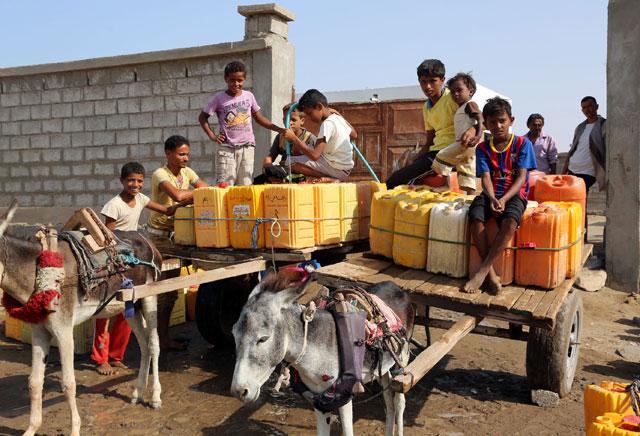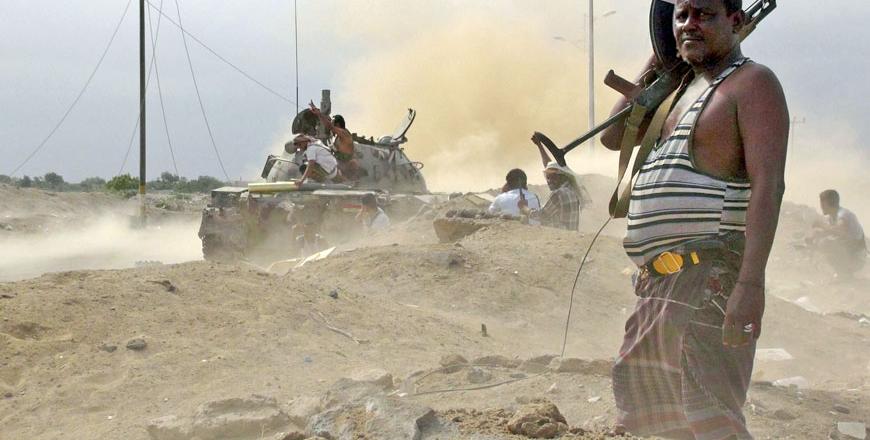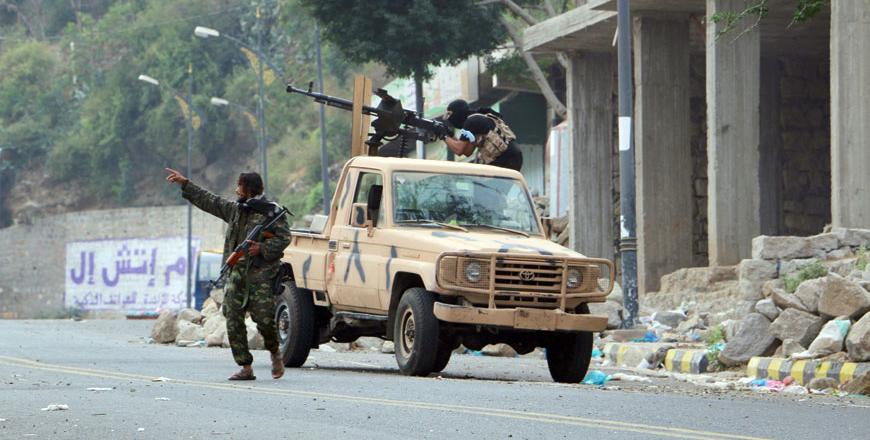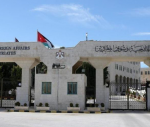You are here
Yemen fighting kills dozens ahead of truce
By AFP - Oct 19,2016 - Last updated at Oct 19,2016

Yemeni children fill empty jerrycans with water from a donated source amid ongoing widespread disruption of water supplies in an impoverished coastal village on the outskirts of the Yemeni port city of Hodeidah on Tuesday (AFP photo)
ADEN — Clashes killed dozens of fighters across Yemen before a UN-brokered ceasefire was to begin Wednesday, as warring parties came under mounting pressure to end the two-year conflict.
The truce is the sixth attempt to end the bloodshed since a Saudi-led Arab coalition intervened in March 2015 to support the government of President Abed Rabbo Mansour Hadi after rebels overran much of Yemen.
Civilians have paid the highest price in a country that was already the Arabian peninsula's poorest.
Almost 6,900 have been killed — more than half of them civilians — while another three million are displaced and millions more need food aid.
A United Nations report said air strikes by the coalition were suspected of causing around half of all civilian deaths, while rebel-affiliated groups were responsible for about a quarter.
The UN special envoy for Yemen, Ismail Ould Cheikh Ahmed, on Sunday, announced the truce from 23:59 (2059 GMT) for an initial three days, subject to renewal.
But clashes killed dozens of fighters across the country on Wednesday, including near the Saudi border and around the capital Sanaa.
At least 30 Houthi rebels and five pro-Hadi fighters died during heavy artillery bombardments near the Red Sea, in Hajja province, a loyalist statement said.
The last ceasefire attempt began in April alongside UN-brokered peace talks in Kuwait but both the rebels and the coalition accused each other of breaches.
After talks collapsed in August, fighting escalated until an October 8 coalition air strike which the UN said killed more than 140 people and wounded at least 525 at a funeral in Sanaa.
The United States announced an "immediate review" of its intelligence and refuelling assistance to the coalition, whose investigative team then released unusually quick findings from a probe of the incident.
It said a coalition aircraft "wrongly targeted" the funeral based on "incorrect information".
US targets Houthis
In another major development, the US Navy for the first time targeted Houthi rebels directly.
On October 13 it hit radar sites which, the US said, were involved in missile launches against a US warship and other vessels.
Yemen's Houthis are allied with members of the security forces loyal to ex-president Ali Abdullah Saleh.
They control the capital Sanaa and other territory but coalition-backed forces earlier pushed them back from the southern port of Aden and adjacent areas.
Both the rebels and pro-government forces have come under increased international pressure to silence their guns.
On Tuesday, US Secretary of State John Kerry hailed the announcement of the new truce.
"We ask the parties to take all steps necessary to advance the implementation of this cessation, call on them to sustain it, and strongly encourage its unconditional renewal," Kerry said.
Hadi's government said it would agree to the truce if rebels also adhered to it, and also called for the insurgents to monitor the ceasefire and end their siege of Yemen's third city, Taez.
The rebels, in a statement on Tuesday night, expressed readiness for a "lasting ceasefire, comprehensive and without conditions".
But clashes rocked Yemen Wednesday ahead of the truce. As well as the Hajja fighting, rebel tanks and other reinforcements in the northern Saada province were bombed in coalition air strikes overnight, a military source said.
Three air strikes also hit a rebel convoy in Omran province, north of Sanaa, the source added.
'Parties getting tired'
At least two rebels and a pro-government fighter were killed during overnight fighting in Taez, according to witnesses and military sources.
And further south, three pro-Hadi fighters died in a rebel missile strike near Bab Al Mandab Strait, a military official said.
In spite of Wednesday's violence, Mustafa Alani, a senior adviser to the Gulf Research Centre, said the prospects for peace were growing.
"Both parties in the conflict are getting tired. The cost of the conflict — human, financial — is very high," he told AFP. "Both parties believe they cannot win, they cannot settle it by military means."
The UN's humanitarian coordinator for Yemen, Jamie McGoldrick, told reporters he hopes the truce will provide a chance for aid workers to reach areas isolated by the fighting.
Saudi Arabia is spending billion of dollars on the war while imposing cutbacks at home.
Kerry said the international community "will continue to work with all parties to conclude a negotiated settlement" to the conflict.
Related Articles
SANAA — Saudi-led coalition warplanes killed 43 soldiers on Wednesday when they targeted a rebel troop headquarters in the Yemeni capital as
SANAA — Saudi-led coalition warplanes have resumed air strikes on Yemen's capital for the first time in three months, killing 14 people Tues
ADEN — Several attacks rocked a fragile ceasefire in Yemen Tuesday as the warring sides began UN-brokered peace talks in Switzerland, milita
















